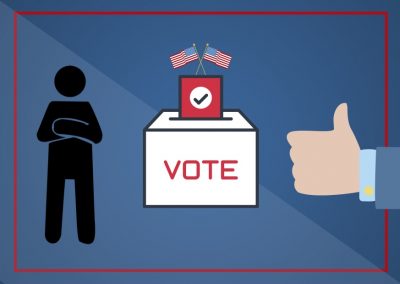Concerns of voter safety at the polls have been rising in the wake of unconfirmed claims by President Donald Trump that election results will be compromised via rigging.
Trump has urged his supporters to go to the polls and monitor them, but has given vague instructions on how they should be “protecting” these polls.
Far-right supporters might take this opportunity to incite violence and intimidate voters, which is the opposite of what poll observers should be doing.

Poll watchers help facilitate fair elections and provide peace of mind to voters who are unsure about the process. Their role varies between each state, but their overall goal is to maintain the integrity of election results. So, it’s imperative that their job is not tainted by partisanship.
Poll observers are typically hired by political organizations or groups to monitor elections in various ways including identifying broken ballots, noting irregularities and challenging ballots they think are illegitimate.
As a way to maintain political discretion, poll observers are not allowed to wear anything that may associate them with a political party or interact with voters. They should be practically unnoticeable in the room.
However, because partisan groups often designate these workers, their motives can be counterproductive to the true values of a poll observer.
Observers could be swayed to ignore certain errors as an attempt to benefit their party or be more critical of those who clearly disagree with their beliefs. It’s not difficult to imagine someone’s bias leading them to interrogate voters about their citizenship status, for example.
Poll watchers can easily cross the line between simply observing and actually intimidating voters. And with Trump’s call to action, there could potentially be a slew of passionate extremists monitoring the polls in an aggressive and unacceptable manner.
Behind Trump’s support of poll watching is a notorious historical precedent set by the Republican Party.
Republicans have intimidated Black and brown voters at the polls for decades, interrogating them for their voter information while sometimes carrying firearms. Poll observing carries a blatant history of racism and voter suppression.
The 1982 consent decree, which prevented the Republican National Committee from using these tactics, expired in 2018. For the first time in nearly 40 years, the presidential election will not have the cushion of this decree. This surprise comes at one of the most polarized times in our nation’s history, which will undoubtedly have an effect on the atmosphere of polling sites.
With Trump’s decision to call on his supporters to protect the polls, we could unfortunately devolve to the same disenfranchisement tactics that had worked in the past.
Poll observers from affiliated groups will also get priority in Massachusetts polling stations over regular volunteers when there is limited space. Due to COVID-19 restrictions, polling space will be especially constrained, so it is likely a majority of observers will be elected from an affiliated group.
However, openly choosing poll observers out of partisan groups does provide the benefit of ensuring parties can be held accountable for their actions via these poll watchers. If someone begins to abuse their power while observing the polls, then parties themselves are held accountable and must address the behavior.
Politics should not influence the job of a poll observer, but in an age where it appears nothing can successfully be nonpartisan, we must be diligent in our fight for an equal democracy. We must refrain from dogging voters at the polls, and cannot fall victim to all the uninformed guidance spewed out by politicians.
Polling booths are not a place for manipulative partisan games. They must be a safe and open environment for citizens to exercise their constitutional rights. We cannot be deceived into thinking they should be used as anything other than that.




















































































































